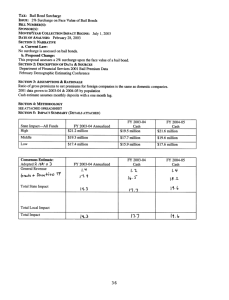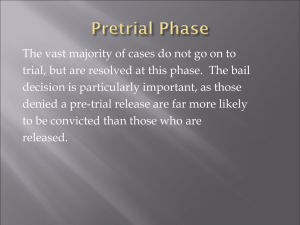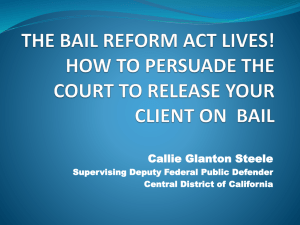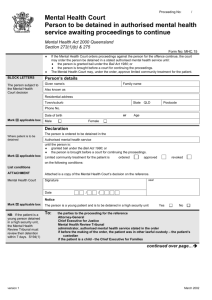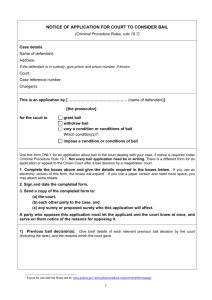applications for support from people detained under the immigration
advertisement
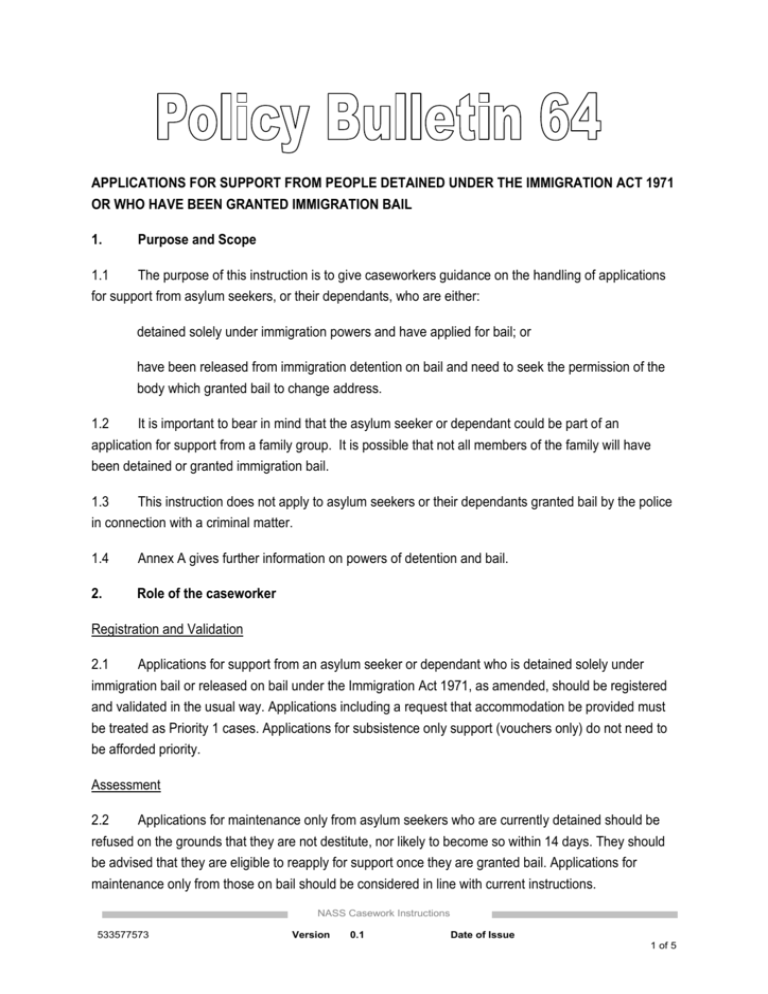
APPLICATIONS FOR SUPPORT FROM PEOPLE DETAINED UNDER THE IMMIGRATION ACT 1971 OR WHO HAVE BEEN GRANTED IMMIGRATION BAIL 1. Purpose and Scope 1.1 The purpose of this instruction is to give caseworkers guidance on the handling of applications for support from asylum seekers, or their dependants, who are either: detained solely under immigration powers and have applied for bail; or have been released from immigration detention on bail and need to seek the permission of the body which granted bail to change address. 1.2 It is important to bear in mind that the asylum seeker or dependant could be part of an application for support from a family group. It is possible that not all members of the family will have been detained or granted immigration bail. 1.3 This instruction does not apply to asylum seekers or their dependants granted bail by the police in connection with a criminal matter. 1.4 Annex A gives further information on powers of detention and bail. 2. Role of the caseworker Registration and Validation 2.1 Applications for support from an asylum seeker or dependant who is detained solely under immigration bail or released on bail under the Immigration Act 1971, as amended, should be registered and validated in the usual way. Applications including a request that accommodation be provided must be treated as Priority 1 cases. Applications for subsistence only support (vouchers only) do not need to be afforded priority. Assessment 2.2 Applications for maintenance only from asylum seekers who are currently detained should be refused on the grounds that they are not destitute, nor likely to become so within 14 days. They should be advised that they are eligible to reapply for support once they are granted bail. Applications for maintenance only from those on bail should be considered in line with current instructions. NASS Casework Instructions 533577573 Version 0.1 Date of Issue 1 of 5 2.3 When dealing with applications for support, including accommodation, from those who are currently detained solely under immigration powers caseworkers should work on the assumption that bail will be granted. Where there is no documentary evidence that an application for bail has been lodged caseworkers must satisfy themselves that such an application has been made. Representatives of asylum seekers applying for bail must provide caseworkers with as many details as possible including the name, Home Office reference number or bail reference number, date of hearing and location of the bail hearing centre. Caseworkers must confirm this by telephoning the Immigration Appellate Authority (IAA), Loughborough Office on 0845 6000877, where the operators will confirm whether a bail application has been received and entered onto the IAA’s computer database. Applications should be assessed in line with current instructions. This includes a decision on whether dispersal is appropriate. The fact that the applicant is either detained or on immigration bail does not, of itself, prevent dispersal. Allocation 2.4 Immigration detainees and those on immigration bail are usually required to live at a specified address. It is vital that we provide an address with a minimum of delay to enable a bail hearing to be held. Caseworkers within allocation must notify the applicant and, where known, their representative, in writing of the permanent address we have allocated. Temporary or emergency addresses must not be used. This is because if the applicant is released to a temporary or emergency address there will be a need to move them to permanent accommodation which will require a further bail hearing. 2.5 The address must be held for 7 working days to enable the bail hearing to be concluded. Where the applicant is detained the support package should be forwarded to the detention centre or prison before the bail hearing takes place with a request that they be handed to the applicant in the event that they are granted bail. Support packages for those refused bail must be returned to NASS so that the proposed accommodation can be re-allocated. The application for support should be refused on the grounds that the applicant is not destitute, nor likely to become so within 14 days. 2.6 If we are notified that bail has been refused solely on the basis that the address is considered unsuitable consideration should be given to providing an alternative address. The fact that the applicant was unable to provide sureties living near the dispersal address would not be sufficient to warrant reconsideration. Provision of accommodation where one of the family is detained 2.7 There will be cases where we are considering an application for support, including accommodation, where one or more of the family members is detained. In such cases caseworkers should ensure that: (i) the accommodation provided will be sufficient to accommodate the family members who are NASS Casework Instructions 533577573 Version 0.1 Date of Issue 2 of 5 detained in the event of their being released; and (ii) the family is accommodated close to the place where the family members are detained. The latter requirement is necessary to ensure that we do not commit a breach of the Human Rights Act 1998. Article 8 of the European Convention on Human Rights gives a right to family life. If, as a result of dispersal, a family is unable to visit one or more of its members who is detained we will be denying them this right. 2.8 It is recognised that the place where the family members are detained is not in or very close to a designated dispersal area. Where this is the case accommodation must be obtained for the family as close to the place of detention as possible. Caseworkers will need to liaise closely with accommodation section on the provision of suitable accommodation. NASS Casework Instructions 533577573 Version 0.1 Date of Issue 3 of 5 ANNEX A Powers of detention 1.1 The Immigration Act 1971 (1971 Act), as amended, provides immigration officers with the power to detain, in certain specified circumstances, those subject to immigration control. Briefly, the powers to detain are those: who may be subject to examination by an immigration officer pending examination and pending a decision to grant or refuse leave to enter; whose leave to enter has been suspended pending examination and pending a decision on whether the leave to enter should be cancelled; who have either been refused leave to enter, had their leave to enter curtailed or served with a notice of illegal entry pending the giving of removal directions or pending removal in pursuance of any directions given; who have been served with a notice that they are in the United Kingdom unlawfully pending the giving of removal directions or pending removal in pursuance of any directions given; who have been recommended for deportation by a court who are neither serving a period of imprisonment nor for the time being released on bail pending a decision on the recommendation; who have been served with a notice of the intention to deport them; and who are the subject of a deportation order. 1.2 Ministers have made it clear that detention must be used only as a last resort and, where detention is necessary, it must be for the shortest possible period. Alternatives to detention 2.1 The 1971 Act provides immigration officers with the power to use alternatives to detention. The most common of these is the grant of temporary admission or release. 2.2 Where an immigration officer has decided that detention is appropriate the 1971 Act provides, in certain circumstances, for the grant of bail.. An application for bail can be made to: an immigration appeals adjudicator; an immigration officer not below the rank of chief immigration officer (CIO); or a police inspector (but only where the person is detained in a police cell). 2.3 The 1971 Act provides that grant of bail can be subject to a number of conditions designed to ensure that the person complies with the terms of their bail. These conditions include: NASS Casework Instructions 533577573 Version 0.1 Date of Issue 4 of 5 requiring the person to live at a specified address; and to report at regular intervals to a police or immigration officer. 2.4 In addition CIOs can impose a condition prohibiting the person from taking employment. 2.5 In Scotland all those to be released on bail must enter into a bail bond. Sureties 3.1 Those granted bail may be required to provide one or more sureties. Sureties may be required to give a recognisance (a promise), usually monetary. A surety may forfeit this recognisance if the person bailed does not answer to their bail or otherwise breaks a condition of bail. In certain circumstances the surety will be required to pay a security before the person can be granted bail. NASS Casework Instructions 533577573 Version 0.1 Date of Issue 5 of 5
